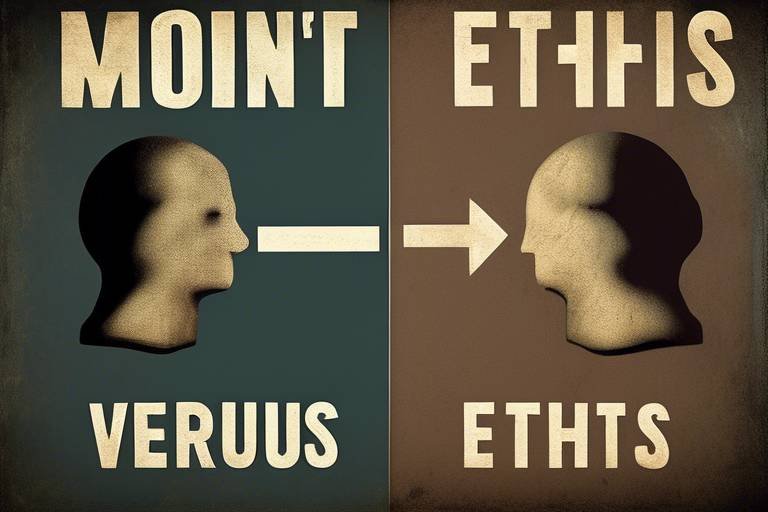Treating Mental Illness - The Ethical Aspects
Mental illness is a complex and multifaceted issue that touches the lives of millions around the globe. As we delve into the ethical aspects of treating these conditions, we uncover a rich tapestry of considerations that healthcare professionals must navigate. From the fundamental principles of patient autonomy to the intricate dance of informed consent, the ethical landscape is both challenging and essential for effective treatment. Understanding these aspects not only enhances patient care but also fosters trust and respect between patients and providers. So, how do we ensure that treatment is both effective and ethically sound? Let’s explore these critical issues in detail.
Respecting patient autonomy is crucial in mental health treatment. Imagine being in a situation where your choices are made for you, regardless of your desires or understanding. It can feel disempowering, right? In the realm of mental health, allowing patients to make informed decisions about their care is paramount. This respect for autonomy means that patients should have the freedom to express their preferences and make choices regarding their treatment options. However, what happens when a patient's preferences conflict with the clinician's recommendations? The implications of overriding a patient's choices can be profound, leading to a potential erosion of trust and a sense of helplessness. Thus, striking a balance between guiding patients and honoring their decision-making capabilities is essential.
Informed consent is a foundational ethical principle in healthcare. When it comes to mental health, this principle takes on additional layers of complexity. Mental health professionals have the responsibility to ensure that patients fully understand their treatment options, including the potential risks and benefits. Imagine trying to make a decision about your health without all the necessary information—it's daunting, isn’t it? Informed consent goes beyond simply signing a form; it requires a thorough conversation between the provider and the patient. This dialogue should encompass the nature of the treatment, alternative options, and any potential side effects. By fostering an environment of open communication, mental health professionals empower patients to take an active role in their care.
Assessing a patient's capacity to consent is vital in mental health care. Not every individual has the same ability to understand the implications of their choices, especially when grappling with severe mental health conditions. The criteria used to determine whether individuals can make informed choices about their treatment often involve evaluating their understanding of the situation, appreciation of the consequences, and ability to reason through the information presented. For instance, a patient experiencing a severe depressive episode may struggle to comprehend the long-term benefits of a particular treatment. Therefore, mental health professionals must be diligent in assessing capacity and providing support where necessary.
Legal frameworks surrounding informed consent vary by jurisdiction, adding another layer of complexity to the ethical considerations in mental health treatment. In some areas, laws may require specific documentation or procedures to ensure that consent is valid and informed. For instance, when working with minors or individuals deemed incapable of consenting, legal guardians may be involved in the decision-making process. Understanding these legal implications is crucial for healthcare providers, as they navigate the responsibilities tied to informed consent while ensuring that patient rights are upheld.
Mental health professionals often face ethical dilemmas regarding consent. Picture a scenario where a patient refuses treatment that could significantly improve their quality of life. The conflict between respecting the patient's autonomy and the perceived need for treatment can create a moral quandary. These dilemmas highlight the importance of ongoing dialogue and collaboration between patients and providers. By engaging in open discussions, professionals can help patients explore their concerns and fears, ultimately guiding them toward informed decisions that prioritize their well-being.
Confidentiality is a cornerstone of mental health treatment. Patients must feel secure that their personal information will be protected, fostering an environment where they can speak freely about their experiences. The ethical obligations of practitioners to safeguard patient information are paramount, as breaches can lead to devastating consequences, including loss of trust and reluctance to seek help in the future. Mental health professionals must navigate the delicate balance between maintaining confidentiality and the legal obligations to disclose information in certain situations, such as when there is a risk of harm to the patient or others.
Family involvement can significantly impact mental health treatment. While it’s often beneficial to include family members in treatment decisions, it raises ethical considerations regarding patient privacy. Families can provide essential support, but they can also unintentionally exert control over the patient’s choices. Thus, mental health professionals must carefully navigate these dynamics, ensuring that the patient’s voice remains at the forefront of the treatment process. It’s a balancing act that requires sensitivity and respect for both the patient and their loved ones.
Balancing support from family with the risk of control is challenging. Consider this: a family member who is overly involved may inadvertently stifle the patient’s ability to express their needs. This can lead to a situation where the patient feels pressured to conform to the family’s expectations. Navigating these dynamics ethically is crucial, and mental health professionals can play a pivotal role by facilitating conversations that empower patients while respecting familial concerns.
Involuntary treatment raises complex ethical questions. Under what circumstances is it justifiable to impose treatment on a patient against their will? While there may be situations where involuntary treatment is necessary to prevent harm, it’s essential to consider the ethical implications for patient rights. Involuntary treatment should always be a last resort, employed only when all other options have been exhausted. Mental health professionals must weigh the potential benefits against the infringement on autonomy, striving to uphold the dignity and rights of the patient.
- What is patient autonomy in mental health treatment?
Patient autonomy refers to the right of individuals to make informed decisions about their own healthcare, including mental health treatment. - How is informed consent obtained in mental health?
Mental health professionals engage in detailed discussions with patients to ensure they understand their treatment options, risks, and benefits before obtaining consent. - What factors determine a patient's capacity to consent?
Factors include the patient's understanding of the treatment, appreciation of the consequences, and ability to reason through the information. - Why is confidentiality important in mental health?
Confidentiality fosters trust between patients and providers, encouraging individuals to seek help and share sensitive information without fear of breaches. - What are the ethical concerns with involuntary treatment?
Involuntary treatment raises questions about the balance between patient rights and the need to prevent harm, making it a complex ethical issue.

Patient Autonomy
Respecting is crucial in mental health treatment. It’s about giving individuals the power to make their own choices regarding their care, which is not just a legal obligation but a moral imperative. Imagine being in a situation where your choices are made for you; it can feel disempowering and frustrating. That’s why ensuring that patients have a say in their treatment is essential. When patients are involved in their care decisions, they are more likely to feel respected, valued, and engaged in their recovery process.
However, respecting autonomy does not come without its challenges. Mental health conditions can impair judgment, making it difficult for some individuals to make informed decisions. This raises an important question: how do we balance the need for patient autonomy with the responsibility to protect those who may not be capable of making sound decisions? It's a complex dance between respecting an individual's rights and ensuring their safety and well-being.
In practice, this means that mental health professionals need to actively engage with their patients, providing them with all the necessary information about their treatment options. This includes discussing potential benefits, risks, and alternatives in a way that is understandable. By doing so, practitioners empower patients to make choices that align with their values and preferences. The emphasis should always be on collaboration rather than coercion.
Moreover, autonomy is not just about making choices; it’s about being informed. A patient who is unaware of their treatment options is not truly autonomous. This is where the concept of informed consent comes into play, which we will explore in the next section. It's crucial that mental health professionals foster an environment where patients feel comfortable expressing their wishes, concerns, and preferences. This can involve asking open-ended questions, actively listening, and validating their feelings.
Ultimately, the goal is to create a therapeutic alliance built on trust and respect. Patients should feel that their voices matter and that they are partners in their own recovery journey. This partnership can lead to better treatment outcomes and a more satisfying experience for both the patient and the provider. It’s like a team sport; when everyone plays their part, the chances of winning improve significantly.

Informed Consent
Informed consent stands as a foundational ethical principle in healthcare, particularly in the realm of mental health treatment. It serves as the bedrock upon which trust is built between the patient and the healthcare provider. Imagine embarking on a journey without knowing your destination or the route you’ll take; that’s akin to undergoing treatment without fully grasping the implications of your choices. Informed consent ensures that patients are not merely passive recipients of care but active participants in their treatment journey.
To achieve informed consent, mental health professionals must engage in comprehensive dialogues with their patients. This means explaining treatment options, potential risks, and expected outcomes in a manner that is not only clear but also empathetic. It’s essential that patients feel empowered to ask questions and express concerns without fear of judgment. After all, how can someone make an informed decision if they don’t fully understand what’s at stake?
Moreover, the process of informed consent is not a one-time event; it’s an ongoing conversation. As treatment progresses, circumstances may change, and so too may the patient’s understanding or preferences. Therefore, it’s crucial for healthcare providers to revisit consent discussions regularly, ensuring that patients remain informed and engaged throughout their treatment journey.
But what happens when a patient’s capacity to provide informed consent is in question? This leads us to the next critical aspect: the capacity to consent. Assessing whether a patient can make informed choices involves evaluating their understanding of the information presented, their ability to appreciate the consequences of their decisions, and their capacity to communicate their choices. This assessment is not just a formality; it is a vital step in safeguarding the patient’s rights and ensuring that their autonomy is respected.
In some cases, legal frameworks come into play, as the laws regarding informed consent can vary significantly across jurisdictions. Mental health professionals must navigate these legal landscapes carefully, ensuring compliance while also honoring ethical obligations. The legal considerations surrounding consent are complex and can significantly impact treatment protocols. For instance, in some areas, minors may require parental consent, while in others, mature minors may have the right to consent to their own treatment.
However, ethical dilemmas often arise in practice. Mental health professionals frequently find themselves in situations where a patient’s autonomy may conflict with their perceived need for treatment. For example, consider a patient who refuses medication that could alleviate severe symptoms of depression. The clinician must weigh the ethical implications of overriding that refusal against the potential benefits of treatment. This balancing act is fraught with challenges, as it touches upon the very essence of what it means to respect a patient’s autonomy while also striving to provide effective care.
In summary, informed consent is not merely a checkbox in the treatment process; it is a dynamic, ongoing dialogue that respects patient autonomy while ensuring that individuals are fully aware of their options and the implications of their choices. It requires mental health professionals to be not only educators but also advocates for their patients, fostering an environment where patients feel safe, informed, and empowered to make choices about their own mental health journey.
- What is informed consent? Informed consent is the process through which patients are educated about their treatment options, risks, and benefits, allowing them to make informed decisions.
- Why is informed consent important in mental health? It empowers patients, respects their autonomy, and fosters a trusting relationship between the patient and the healthcare provider.
- How is a patient's capacity to consent assessed? Mental health professionals evaluate a patient’s understanding, appreciation, and ability to communicate their treatment choices.
- What legal considerations surround informed consent? Legal frameworks vary by jurisdiction, affecting how consent is obtained, especially for minors or individuals with diminished capacity.
- What ethical dilemmas can arise with informed consent? Conflicts may occur when a patient’s autonomy clashes with a clinician’s perception of the need for treatment, particularly in cases of severe mental illness.

Capacity to Consent
The concept of is a fundamental aspect of mental health care that cannot be overlooked. It refers to a patient's ability to understand the information provided about their treatment options, appreciate the consequences of their decisions, and communicate a choice. This is not merely a checkbox in a form; it is an essential part of respecting a patient's autonomy and ensuring ethical treatment. Imagine trying to navigate a complex maze without a map; that’s how it feels for someone who lacks the capacity to fully grasp their treatment options. It's crucial for mental health professionals to assess this capacity accurately, as it can significantly influence the course of treatment.
Assessing capacity involves several criteria, which can vary depending on the individual and the specific situation. Generally, mental health professionals look for the following components:
- Understanding: Does the patient comprehend the information about their condition and the proposed treatments?
- Appreciation: Can the patient recognize how this information applies to their own situation?
- Reasoning: Is the patient able to weigh the pros and cons of the treatment options?
- Communication: Can the patient express a choice regarding their treatment?
It's important to note that capacity is not a static trait; it can fluctuate based on various factors such as the patient's mental state, the complexity of the treatment, and even the timing of the assessment. For instance, a patient may have the capacity to consent one day but might struggle with it the next, depending on their mental health condition. This variability presents a unique challenge for healthcare providers, who must remain vigilant and responsive to their patients' needs.
Furthermore, legal considerations play a significant role in the assessment of capacity. Different jurisdictions have different laws governing what constitutes informed consent and capacity. For example, in some places, a patient may be deemed unable to consent if they are experiencing a severe mental health crisis, while in others, the threshold may be higher. This inconsistency can create dilemmas for mental health professionals who are trying to do what is best for their patients while also adhering to the law.
Ultimately, the ethical implications of capacity to consent extend beyond just legal compliance. They touch on the very essence of patient care, which is rooted in respect, dignity, and empowerment. When mental health professionals take the time to ensure that their patients truly understand and are able to make informed decisions about their treatment, they are not just fulfilling a duty; they are fostering a therapeutic alliance built on trust and respect. This alliance is crucial because it can significantly impact treatment outcomes, leading to better adherence to treatment plans and improved overall mental health.
- What happens if a patient is deemed unable to consent?
In such cases, a surrogate decision-maker may be appointed, or the treatment team may seek to provide care that is in the patient's best interest, always striving to respect the patient's rights and dignity. - Can a patient regain their capacity to consent?
Yes, capacity can fluctuate. Patients may regain their ability to understand and make informed decisions as their mental health improves. - How often should capacity assessments be conducted?
Capacity assessments should be ongoing, especially if a patient's mental state changes or if new treatment options are presented.

Legal Considerations
The legal landscape surrounding informed consent in mental health treatment is complex and varies significantly across different jurisdictions. Each state or country has its own laws that dictate how mental health professionals must approach consent, which can sometimes lead to confusion and ethical dilemmas. For instance, while the principle of informed consent is universally recognized, the specific requirements for obtaining it can differ. Some jurisdictions may require a detailed explanation of treatment options, while others may only necessitate a brief overview.
Moreover, the age of consent can also play a pivotal role in how mental health professionals approach treatment. In many places, minors may not have the legal capacity to consent to their own treatment, which necessitates parental or guardian involvement. This raises the question: how do we respect a young person's autonomy while also adhering to legal requirements? The balance between legal obligations and ethical responsibilities is a tightrope that many practitioners walk daily.
Additionally, legal frameworks often include stipulations for situations where individuals may be deemed incapable of giving informed consent due to their mental state. In such cases, healthcare providers must navigate the murky waters of determining a patient's capacity to consent. This involves evaluating whether the individual can understand the information presented, appreciate the consequences of their decisions, and communicate their choice. The criteria for this assessment can be subjective, leading to potential conflicts between patient rights and the perceived need for intervention.
Furthermore, the implications of breaching confidentiality can have serious legal consequences. If a mental health professional discloses a patient's information without consent, they may face legal repercussions, including lawsuits or loss of licensure. This underscores the importance of understanding both the ethical and legal obligations that come with patient confidentiality. The intersection of law and ethics in mental health care is a continually evolving field, requiring practitioners to stay informed about changes in legislation and best practices.
In summary, legal considerations in mental health treatment are multifaceted and require careful navigation. Mental health professionals must not only be aware of the laws governing informed consent but also the ethical implications of their actions. Striking a balance between legal compliance and ethical responsibility is essential for providing optimal care while respecting patient rights.
- What is informed consent in mental health treatment?
Informed consent is the process by which a patient is made aware of the treatment options available, along with the risks and benefits associated with each option, allowing them to make an informed decision about their care. - How does age affect a patient's ability to give consent?
In many jurisdictions, minors may not have the legal capacity to consent to treatment, requiring parental or guardian approval. However, some regions allow for "mature minors" to make certain health decisions independently. - What happens if a patient cannot give informed consent?
If a patient is deemed incapable of giving informed consent due to their mental state, healthcare providers may need to involve family members or legal guardians in the decision-making process, while also considering the patient's best interests. - What are the legal consequences of breaching confidentiality?
Disclosing a patient's confidential information without consent can lead to legal actions, loss of professional licensure, and damage to the therapist-patient relationship.

Ethical Dilemmas
In the intricate world of mental health treatment, ethical dilemmas often arise, presenting mental health professionals with challenging situations that test their moral compass. Imagine being in a position where you must choose between respecting a patient's wishes and ensuring their safety. This is the reality for many practitioners who navigate the delicate balance between patient autonomy and the perceived necessity for intervention. One common scenario involves patients who refuse treatment for severe mental health conditions, such as schizophrenia or severe depression. In such cases, healthcare providers may grapple with the decision to override a patient's wishes in the name of their well-being.
Furthermore, the ethical landscape becomes even more complex when considering the varying degrees of insight patients have regarding their conditions. Some individuals may lack the capacity to fully understand their situation, leading professionals to question whether it's ethical to honor their refusal of treatment. This raises an essential question: How do we determine when it is appropriate to intervene against a patient's will? The answer is not always straightforward and often depends on the specific circumstances surrounding each case.
Another ethical dilemma arises when considering the potential for harm. For instance, if a patient poses a risk to themselves or others, the healthcare provider faces a moral obligation to act. However, this intervention can lead to feelings of betrayal or mistrust from the patient, which can hinder the therapeutic relationship. It's a classic case of the “double-edged sword”—acting in the best interest of the patient may inadvertently cause emotional distress, complicating their treatment journey.
Additionally, the involvement of family members in treatment decisions introduces another layer of complexity. While family support can be invaluable, it can also lead to conflicts of interest. For example, a family member might push for a treatment that the patient does not want, believing they know what's best. This situation raises ethical questions about the rights of the patient versus the intentions of the family. Practitioners must navigate these waters carefully, often requiring them to mediate between the patient and their loved ones to ensure that the patient’s voice is heard and respected.
To illustrate these dilemmas further, consider the following table that summarizes some common ethical dilemmas faced in mental health treatment:
| Dilemma | Considerations |
|---|---|
| Patient Refusal of Treatment | Autonomy vs. Safety |
| Involuntary Commitment | Rights of the Individual vs. Public Safety |
| Family Involvement | Support vs. Control |
| Confidentiality Breaches | Patient Trust vs. Duty to Warn |
As we navigate these ethical dilemmas, it's essential for mental health professionals to engage in open dialogues with their patients, fostering an environment of trust and understanding. By doing so, they can better navigate the murky waters of mental health treatment, ensuring that the patient's rights and well-being remain at the forefront of care.
- What is patient autonomy? - Patient autonomy refers to the right of patients to make informed decisions about their own healthcare, including the right to refuse treatment.
- Why is informed consent important? - Informed consent is crucial because it ensures that patients understand the risks and benefits of their treatment options, allowing them to make educated choices.
- What are the legal implications of consent in mental health? - Legal frameworks for consent vary, but generally, healthcare providers must ensure that patients are capable of understanding their treatment options and can provide consent voluntarily.
- How do ethical dilemmas affect mental health treatment? - Ethical dilemmas can complicate the treatment process, requiring professionals to balance patient rights with safety and treatment efficacy.

Confidentiality and Privacy
In the realm of mental health treatment, confidentiality and privacy are not just buzzwords; they are the bedrock upon which trust is built between patients and their healthcare providers. Imagine stepping into a therapist's office, where you lay bare your deepest fears, anxieties, and traumas. The assurance that these intimate details will remain confidential is what allows many individuals to open up and embark on their healing journey. However, this ethical obligation to protect patient information comes with its own set of challenges and implications.
The ethical responsibility to maintain confidentiality is paramount, as it fosters a safe space for patients to explore their mental health concerns without fear of judgment or exposure. Mental health professionals are bound by laws and ethical codes that dictate how patient information should be handled. Breaches of confidentiality can lead to devastating consequences, not only for the individual but also for the therapeutic relationship as a whole. When trust is broken, it can deter individuals from seeking help altogether, perpetuating a cycle of suffering.
However, there are situations where confidentiality may be compromised. For instance, if a patient poses a risk to themselves or others, mental health professionals face the ethical dilemma of balancing patient privacy with the duty to protect. This is often referred to as the “duty to warn”, which mandates that if a therapist believes a patient is a danger to themselves or others, they may need to disclose information to prevent harm. Such instances highlight the complex interplay between confidentiality and safety, making it essential for practitioners to navigate these waters with care and compassion.
Furthermore, confidentiality extends beyond the therapy session. It encompasses all forms of communication, including electronic records, emails, and even casual conversations in public spaces. Mental health practitioners must implement strict protocols to safeguard this information. For example, secure electronic health records, staff training on privacy policies, and clear communication with patients about how their information will be used are crucial steps in protecting confidentiality.
In addition to legal and ethical considerations, respecting patient privacy also involves being sensitive to cultural differences. Different cultures have varying beliefs about privacy and the sharing of personal information. Mental health professionals must be aware of these nuances and approach each patient with cultural competence to ensure that their privacy is honored in a way that aligns with their values.
In summary, confidentiality and privacy are fundamental to effective mental health treatment. They not only protect the patient but also enhance the therapeutic alliance, enabling individuals to pursue healing without fear. As mental health professionals navigate the ethical landscape of confidentiality, they must remain vigilant, ensuring that their practices uphold the highest standards of privacy while also prioritizing patient safety.
- Why is confidentiality important in mental health treatment?
Confidentiality is crucial because it creates a safe space for patients to share their thoughts and feelings without fear of judgment or exposure. - What are the limits of confidentiality?
Confidentiality may be breached if a patient poses a risk to themselves or others, or if there are legal obligations to report certain information. - How is patient information protected?
Mental health professionals use secure electronic health records, train staff on privacy policies, and communicate clearly with patients regarding their information. - What should I do if I feel my confidentiality has been violated?
If you believe your confidentiality has been compromised, it's important to discuss your concerns with your mental health provider or seek guidance from a legal professional.

Role of Family and Caregivers
When it comes to treating mental illness, the role of family and caregivers cannot be overstated. These individuals often serve as the primary support system for those struggling with mental health issues, providing emotional, practical, and sometimes financial assistance. However, with this support comes a complex set of ethical considerations. How do we ensure that family involvement enhances treatment without infringing on the patient's autonomy? This delicate balance is crucial for fostering an environment conducive to healing.
Family members can offer insights into the patient’s history, behaviors, and triggers that may not be apparent to mental health professionals. Their involvement can lead to a more comprehensive understanding of the patient's condition, ultimately leading to better treatment outcomes. Yet, it’s essential to remember that while family support is invaluable, it can also lead to potential conflicts. For instance, a family member might have a strong opinion about what treatment should be pursued, which could overshadow the patient’s own preferences and desires.
Moreover, the ethical implications of family involvement often revolve around the concepts of support versus control. While family members typically wish the best for their loved ones, their desire to help can sometimes manifest as control, particularly in cases where the patient may struggle to make decisions for themselves. This is where the line between support and control blurs. For example, a caregiver might feel justified in making decisions on behalf of a patient who is experiencing severe anxiety or depression, believing that they are acting in the patient's best interest. However, this can lead to feelings of powerlessness in the patient, which could exacerbate their condition.
To navigate these dynamics ethically, it's vital to prioritize the patient’s well-being. This means involving them in discussions about their treatment plan and ensuring they feel heard and respected. Open communication is key. Family members should be encouraged to express their concerns and opinions, but it should be made clear that the ultimate decision rests with the patient. This approach not only respects the patient's autonomy but also fosters a sense of empowerment, which is essential for recovery.
In some cases, mental health professionals may recommend family therapy as a way to address these dynamics. Family therapy can provide a structured environment where family members can learn how to support the patient without overstepping boundaries. In this therapeutic setting, families can explore their roles and responsibilities, helping them understand the importance of maintaining a balance between support and control.
As we delve deeper into the ethical implications of family involvement in mental health treatment, it’s crucial to consider the broader context. The dynamics of family relationships can vary widely based on cultural, social, and economic factors. For instance, in some cultures, family is seen as a collective unit where decisions are made together, while in others, individual autonomy is highly valued. Mental health professionals must be sensitive to these cultural differences, adapting their approach to respect the values and beliefs of the patient and their family.
In conclusion, the role of family and caregivers in mental health treatment is both significant and complex. While their involvement can greatly enhance the support system for patients, it is imperative to navigate this relationship with care, ensuring that the patient’s autonomy is respected and prioritized. By fostering open communication and providing education about the treatment process, families can become allies in the journey toward recovery, rather than obstacles.
- Why is family involvement important in mental health treatment?
Family members can provide crucial support, insights, and understanding of the patient’s condition, which can lead to better treatment outcomes. - How can families ensure they are supporting rather than controlling?
By prioritizing open communication and respecting the patient’s preferences, families can create a supportive environment that empowers the patient. - What role does culture play in family involvement?
Cultural beliefs can influence how families approach mental health treatment, affecting the dynamics of support and decision-making.

Support vs. Control
When it comes to mental health treatment, the dynamics between support and control can be as intricate as a dance. Family members often play a pivotal role in a patient's journey, offering emotional support that can be both uplifting and essential. However, the line between support and control can sometimes blur, leading to ethical dilemmas that challenge the very essence of patient autonomy. Imagine a scenario where a family member, acting out of love, insists on certain treatment options or even pushes for hospitalization. While their intentions may stem from a place of concern, such actions can inadvertently strip away the patient's sense of agency and independence.
It’s crucial to recognize that while family support can enhance a patient's recovery, it can also become overwhelming if not managed thoughtfully. Striking a balance between being supportive and allowing the patient to have control over their treatment decisions is not just important—it's ethically necessary. Involving family in treatment discussions can foster a sense of community and understanding, yet it must be approached with caution to ensure that the patient’s voice is not drowned out. Here are some considerations that can help navigate this delicate balance:
- Encourage Open Communication: Family members should be encouraged to express their concerns while also being receptive to the patient's feelings and choices.
- Set Boundaries: Establishing clear boundaries can help ensure that support does not morph into control. This means respecting the patient's right to make decisions about their own care.
- Educate Family Members: Providing education about the patient's condition can empower family members to support rather than control, fostering a more collaborative environment.
Moreover, mental health professionals play a crucial role in facilitating these discussions. They can help mediate conversations between patients and their families, ensuring that the patient's preferences are prioritized. This collaborative approach not only respects the patient's autonomy but also helps families feel valued and involved in the treatment process. After all, mental health recovery is not just a solo journey; it’s often a collective effort that requires understanding, empathy, and respect for everyone involved.
In conclusion, the tension between support and control in mental health treatment is a complex issue that requires careful navigation. By fostering an environment where patients feel empowered to make their own choices while still receiving support from their families, we can create a more ethical and effective treatment landscape. Ultimately, the goal should be to enhance the patient's well-being without compromising their autonomy, ensuring that they are not just recipients of care but active participants in their own recovery journey.
- What is the role of family in mental health treatment? Family members can provide emotional support and help patients navigate their treatment journey, but their involvement must respect the patient's autonomy.
- How can families avoid controlling behavior? Families should focus on open communication, set boundaries, and educate themselves about the patient's condition to provide support without exerting control.
- What should I do if my family is not supportive of my treatment choices? It may be helpful to discuss your feelings with a mental health professional who can assist in facilitating conversations with your family.

Involuntary Treatment
Involuntary treatment is a complex and often contentious issue within the realm of mental health care. It raises a multitude of ethical questions that challenge the very foundation of patient rights and autonomy. Imagine a scenario where a person, struggling with severe mental illness, is unable to recognize the need for help. In such cases, mental health professionals may find themselves in a position where they must consider involuntary treatment to ensure the safety of the individual and others. This delicate balance between protecting individual rights and ensuring necessary care can lead to ethical dilemmas that are not easily resolved.
One of the primary justifications for involuntary treatment is the concept of danger to self or others. When a patient poses a significant risk, mental health professionals may argue that taking action without the patient's consent is not only justified but necessary. However, this raises questions about the criteria used to assess risk. Who decides what constitutes a danger? How do we ensure that these decisions are made fairly and without bias? The answers to these questions are not straightforward and often vary from one jurisdiction to another.
Moreover, the process of involuntary treatment can sometimes feel like a double-edged sword. On one hand, it can provide immediate relief and stabilization for individuals in crisis. On the other hand, it can lead to feelings of resentment and mistrust toward the healthcare system. Patients who undergo involuntary treatment may feel stripped of their autonomy, leading to long-term psychological repercussions. It's akin to a parent forcing a child to take medicine; while the intention is to heal, the child may develop a lasting aversion to treatment.
To navigate these ethical waters, mental health professionals must adhere to a set of guiding principles. These include:
- Assessment of Need: Determining whether the patient truly requires involuntary treatment based on clear, objective criteria.
- Minimization of Coercion: Striving to use the least restrictive means possible to achieve the desired outcome.
- Regular Review: Continuously evaluating the patient’s condition and the necessity of ongoing involuntary treatment.
Legal frameworks also play a crucial role in shaping the practice of involuntary treatment. Different regions have varying laws that govern when and how involuntary treatment can be administered. For instance, some jurisdictions may require a court order, while others may allow a physician's discretion in emergency situations. Understanding these legal nuances is essential for mental health professionals to ensure they are acting within the law while also prioritizing ethical considerations.
Involuntary treatment is not merely a clinical decision; it is a profound ethical issue that requires careful consideration of the patient's rights, the potential benefits of treatment, and the broader implications for mental health care. As society continues to evolve in its understanding of mental illness, the dialogue surrounding involuntary treatment must also progress, ensuring that the voices of patients are heard and respected.
- What is involuntary treatment? Involuntary treatment refers to the administration of mental health care without the consent of the patient, typically in situations where the individual poses a danger to themselves or others.
- How is the need for involuntary treatment determined? Mental health professionals assess the risk of harm and the individual’s capacity to make informed decisions about their treatment.
- What are the ethical concerns surrounding involuntary treatment? Key concerns include the violation of patient autonomy, the potential for abuse, and the long-term psychological impact on the individual.
- How do legal frameworks impact involuntary treatment? Laws governing involuntary treatment vary by jurisdiction, influencing how and when treatment can be administered without consent.
Frequently Asked Questions
- What is patient autonomy in mental health treatment?
Patient autonomy refers to the right of individuals to make informed decisions about their own healthcare. In mental health treatment, this means respecting a patient's choices and preferences, even if they differ from what the healthcare provider believes is best. It's like being the captain of your own ship; you should have the final say on where it sails!
- How is informed consent obtained in mental health care?
Informed consent is obtained by ensuring that patients understand their treatment options, including potential risks and benefits. Mental health professionals typically explain these details clearly and allow patients to ask questions. Think of it as a friendly conversation where you’re given all the tools to decide what’s best for you!
- What factors determine a patient's capacity to consent?
A patient's capacity to consent is assessed based on their ability to understand information, appreciate the consequences of their decisions, and communicate their choices. It’s like a mental fitness test; if you can grasp the situation and make a choice, you’re good to go!
- What are the legal considerations surrounding informed consent?
The legal considerations for informed consent can vary widely depending on the jurisdiction. Healthcare providers must adhere to local laws to ensure that consent is valid and ethical. It’s essential to be aware of these laws to avoid any legal pitfalls—think of it as knowing the rules of the road before you start driving!
- What ethical dilemmas can arise regarding patient consent?
Ethical dilemmas often occur when a patient's wishes conflict with the healthcare provider's belief that treatment is necessary. For example, if a patient refuses treatment that could significantly improve their condition, the provider may struggle with whether to respect that decision or intervene. It's like walking a tightrope, balancing patient rights with the desire to help!
- Why is confidentiality important in mental health treatment?
Confidentiality is crucial because it helps build trust between patients and providers. When patients know their information is safe, they’re more likely to share openly, which is vital for effective treatment. Imagine it as a secret garden; the more you protect it, the more it can flourish!
- How can family involvement impact mental health treatment?
Family involvement can provide essential support, but it can also lead to ethical challenges, especially regarding patient privacy. Balancing family input while respecting the patient's need for confidentiality is key. It’s a bit like a dance—you need to find the right rhythm to keep everyone in sync!
- What is the difference between support and control from family members?
Support from family means providing encouragement and understanding, while control can involve making decisions for the patient or pressuring them. Navigating this balance is essential to ensure the patient feels empowered rather than overwhelmed. Think of it as being a coach; you want to guide, not dictate!
- When is involuntary treatment considered ethical?
Involuntary treatment may be deemed ethical in situations where a patient poses a danger to themselves or others, or when they cannot make informed decisions due to their mental state. However, it’s a sensitive area that requires careful consideration of the patient’s rights and well-being. It’s like using a safety net; sometimes it’s necessary to catch someone before they fall!



















